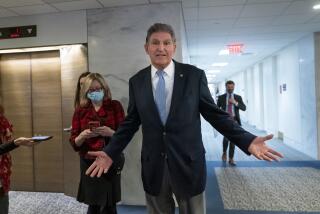Mongolian Dissidents Form Opposition Party : Asia: The government’s tolerance is tested by demands for trials and punishment of Communist officials.
ULAN BATOR, Mongolia — A congress of Mongolian dissidents meeting here Sunday proclaimed the creation of an opposition political party, called for the resignation of the nation’s top Communist leaders, and demanded the trial and punishment of “those officials who brought the country its foreign dependence and economic crisis.”
Although opposition parties are still illegal in Mongolia, the government allowed 500 delegates of the dissidents’ organization to meet openly in the auditorium of the Trade Union Cultural Palace.
The Mongolian government, which has been affected by the political changes sweeping through the Soviet Bloc, has adopted an extremely conciliatory attitude toward opposition activities, including a series of rallies that began in December. But the limits of the government’s tolerance are not clear.
Creation of the new Mongolian Democratic Party was decided on Saturday evening at a meeting of 200 of the 500 delegates who attended Sunday’s meeting. It was announced to the nation during a live Sunday morning television and radio broadcast of the opening two hours of the First Congress of the Mongolian Democratic Assn., the new party’s parent organization.
Speakers at the congress called for a multiparty system, accelerated economic development, a revival of traditional Mongol culture, freedom of religion and greater opportunities for private ownership, including an end to limits on the size of livestock herds that may be individually owned.
In a “declaration to the Mongolian people,” the congress called for members of the ruling Mongolian People’s Revolutionary Party--the official name for the country’s ruling Communists--to work together with the opposition to “speed up economic, political and social development . . . and take better care of the poor, the handicapped and those victimized in years of repression.”
G. Boshigt, one of the leaders of the new party, said in an interview during a break in the congress that the decision to launch an opposition party came about because “the domestic and international situation is very benign (with a suitable climate in which) to establish this new party.”
“We trust the ruling party--that they will be wise and realistic, and take their place to be an equal of our party,” Boshigt continued. “But of course I cannot forecast. . . . According to our political speculations and calculation, one of the possibilities is that some people in that party will suggest a crackdown. But we know that within the party there are many people who agree with our ideas.”
At noon Sunday, a group of about 300 university students and supporters held a brief pro-democracy rally near Ulan Bator’s circus building, then marched about 15 minutes to the Trade Union Cultural Palace, chanting “Democracy! Democracy!”
Dissident leaders addressed the crowd, which soon reached about 2,500, from the roof of the palace’s entryway.
“If you are patriotic, we should avoid any kind of disorder,” pleaded D. Sosorbaram, one of the opposition leaders. “We should protect law and order. We should be patient. Everything should be by legal means.”
Conversations with protesters gathered outside the meeting hall reflected deep dissatisfaction.
“For 40 years, we had no voice of our own,” said M. Demberel, a 50-year-old communications worker. “We, the working-class people, could not say frankly what we thought of things, and no one took into consideration our interests.” Demberel said he felt a majority of the present ruling Politburo should resign, including all of those “appointed by the old regime” of former leader Yumjaagiyn Tsedenbal, who was removed from the presidency “on health grounds.”
Although a dozen people in the crowd overheard Demberel’s remarks, he said he felt no fear about speaking bluntly.
“We have been suppressed sometimes, but I have no fear,” he declared. “The times are changing.”
Not everyone, however, is as sympathetic to the opposition. During the march by the mostly well-dressed students, a young man attired in dirty and slightly torn, padded gray trousers and jacket laughed loudly and shouted: “Have you ever worked?”
“They have never worked, and they don’t know what work is,” the man, a 23-year-old construction worker named Erdene, later explained to a reporter. “They have done nothing yet. They are only studying theory.”
Erdene said he does not believe such marches and rallies will cause trouble but that he does not support them.
Opposition pressure seems to be having the intended effect of accelerating political change.
Prime Minister Dumaagiyn Sodnom told Japanese journalists last week that officials of the government and ruling party would meet with opposition leaders after Sunday’s congress.
The party, however, does not appear fully decided on how to deal with the growing opposition.
“The (Communist) Party admits political pluralism,” T. Chemiddorj, acting director of the government Information Department, told foreign reporters late last week. “That means political pluralism can exist both within the party and in our society. It doesn’t exclude the possibility of a multiparty system.
“The party hasn’t announced the terms of proclaiming a multiparty system--whether to announce it this year, next year. It hasn’t worked out any plans.”
Chemiddorj was then asked what the government would do if the opposition, as it did, announced the official formation of a new party at Sunday’s congress.
“We had better wait and see,” he replied.
More to Read
Sign up for Essential California
The most important California stories and recommendations in your inbox every morning.
You may occasionally receive promotional content from the Los Angeles Times.










